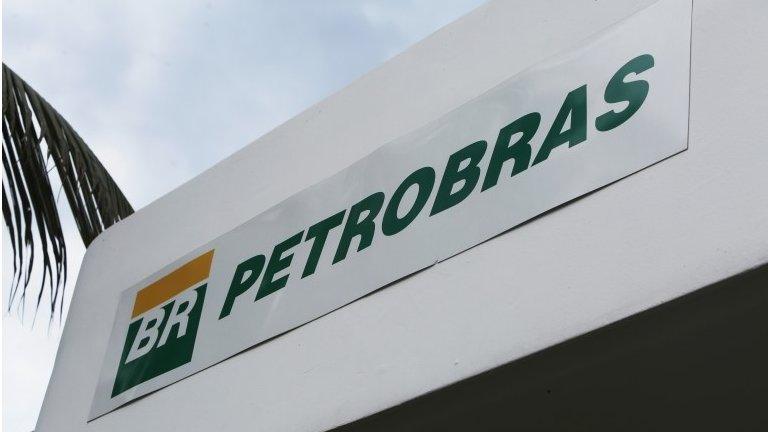The real losers in Brazil's Petrobras scandal
- Published
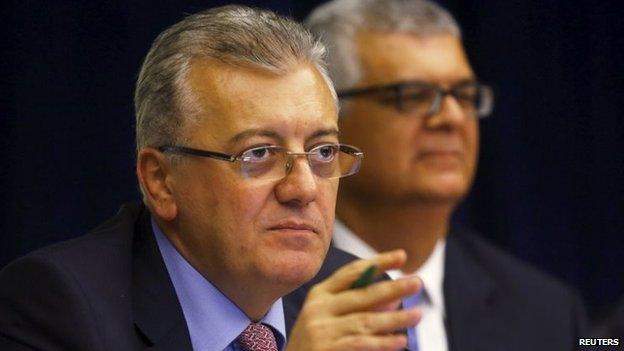
Petrobras President Aldemir Bendine said the company was ready to do business
"We are coming clean and we are being open about mistakes made with company's resources," said Petrobras President Aldemir Bendine.
Mr Bendine was announcing almost eye-watering losses which the Brazilian oil giant has finally had to admit writing off against corruption.
These financial results, released several months behind schedule, may well mark the start of the way back for Petrobras as a company with which to do business, and in which to invest.
After months of speculation, we now know how much money exchanged hands or was "lost" in Brazil's biggest ever corruption scandal.
A total of $2bn, give or take the odd cent, as massive bribes were routinely paid for lucrative contracts with the company.
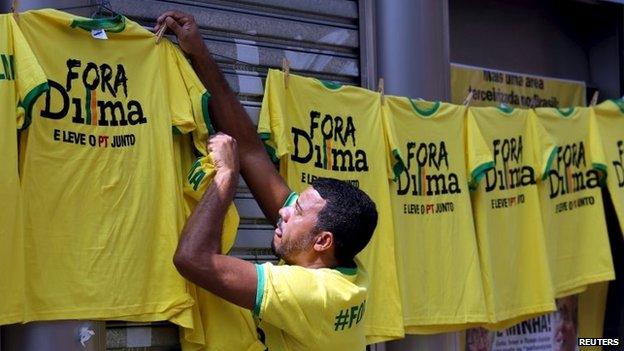
Some protesters have been calling for President Dilma Rousseff to go
Brazil's President Dilma Rousseff was chair of the Petrobras board while the worst of the excesses were taking place.
Now under threat of impeachment, Dilma Rousseff has at times appeared indecisive in the eye of the storm.
And although most commentators say the Petrobras scandal will not cost her the presidency, the aftermath will dominate and influence her government's direction and policies for much of the next year.
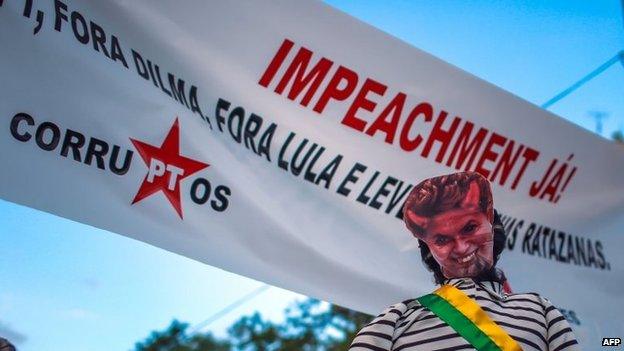
President Rousseff is a former chair of the Petrobras board
Wounded giant
These Petrobras figures were approved by its auditors and the company's stock has recovered steeply after several months of steady decline.
But it is still a wounded giant, heavily indebted and - despite portraying itself as the victim of a complex crime - several former senior employees were at the apex of the scam.
One of the first major figures to be implicated in the scandal has now also become the first to be punished.
After his arrest, the former head of Petrobras' operations Paulo Roberto Costa quickly turned state's witness, naming names and giving detailed explanations of how contracts were inflated.
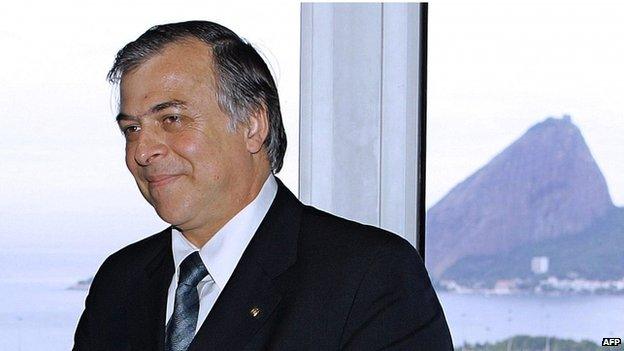
Paulo Roberto Costa was arrested last year during a police investigation into money laundering
He was sentenced to seven years in jail but in return for his "absolute" co-operation he will serve just a year under house arrest.
However, such is the scope and complexity of the investigation, he may well face other charges.
Costa and with black-market currency dealer Alberto Youssef are among the first to be sentenced.
But they are unlikely to the be the last.
Tough year ahead
Dozens of politicians, senior business figures and middle men have been arrested.
They have been accused of running an elaborate scheme which benefited individuals, and also the governing Workers' Party, to the tune of hundreds of millions of dollars.
Ever since the investigation began it "has unravelled like a ball of string," one insider told me.
He was speaking in the southern Brazilian city of Curitiba where the operation is still based, despite attempts by some defence lawyers to get the case taken away from the small but tenacious team of investigators.
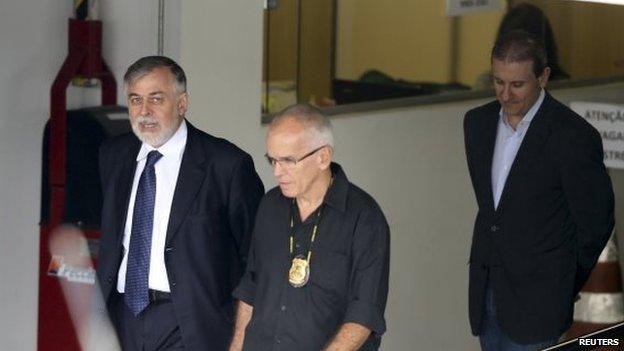
Costa (left) and Youssef (right) were among the first to face arrest over the scandal
Across Brazil tens of thousands of jobs have been lost as Petrobras and other big firms caught up in the scandal lay off workers and delay investments.
Putting things right will take time and this could still be a tough year for Brazil's wider economy.
'Silver lining'
Observers like Eurasia Group's Joao Augusto de Castro Neves say President Rousseff should now use what has been a damaging episode to implement long overdue reforms.
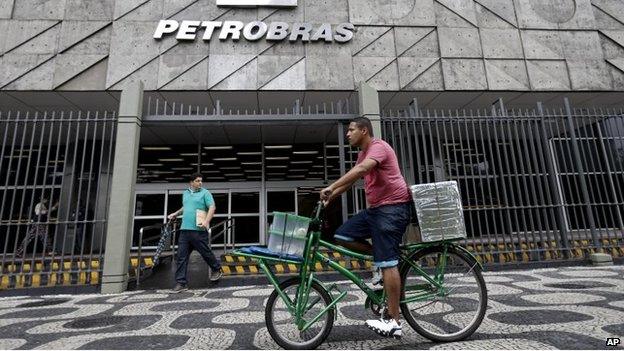
Some analysts say this could be Petrobras' chance to implement change
"The silver lining is that you'll see a better corporate governance structure for Petrobras and other companies that operate in Brazil," he says.
"Unfortunately there is no major solution to end corruption but I think it will lead to more transparency, more oversight and less corruption."
That may be an unrealistically optimistic take on the situation ahead.
Brazil's economy is still highly regulated and protective. Some sectors, if not all, are wary of change.
Of most concern is a fear that with so many senior business and political figures caught up in the Petrobras scandal, the country simply cannot afford to take everyone to task.
Despite the impressive tenacity and robustness of the Brazilian judiciary in this process, the overwhelming view on the street is that while individuals like Costa and Youssef will take the rap, politicians will look after each other, delaying or limiting the scope of any inquiry.
Too big to fail
The many giant construction companies also implicated have been cornerstones of Brazil's economic growth over the last decade and may be seen as strategically too big to fail.
Petrobras as a company will survive: there is too much oil off Brazil's coast to keep the investors away for long.
The construction companies are needed to continue building venues for the 2016 Olympic Games in Rio de Janeiro as well as the other ambitious projects that help keep Brazil's economy safely in the world's top 10.
But there have already been losers.
Thousands of laid-off oil workers are trying to recover money still owed to them, some by protesting in vain outside the Petrobras headquarters here in Rio.
The bottom line is that those who pay for the excess of corruption and greed at the top are those at the bottom of Brazilian society.
- Published23 April 2015
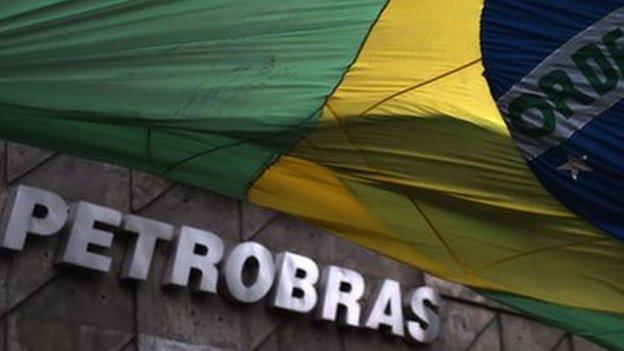
- Published22 April 2015
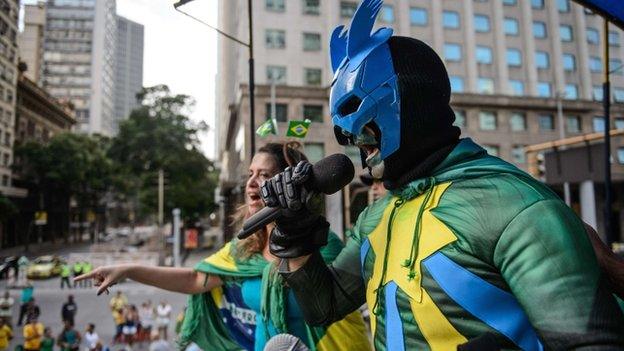
- Published7 March 2015
